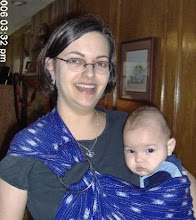Research confirms what breastfeeding and childbirth professionals have been saying for years, Breastfeeding Does Not Create Sagging Breasts:
However, there are some factors that increase the chance of sagging breasts. A higher BMI and larger bra size before pregnancy increased the chance that the breast would sag. Also, smoking history, the number of pregnancies, and age also affected the risk factors of getting sagging breasts.
Factors that did not affect whether or not the women had sagging breasts were the number of children that were breastfed and the amount of time spent breastfeeding each child. Also, the amount of weight gained during pregnancy apparently had no affect on long term breast shape.
News of the weird - Breastfeeding smell linked to higher sex drive.
The USDA announced this week a new MyPyramid for Pregnant and Nursing Moms. The website feature allows you to put in some information about you and your baby or pregnancy, and get recommendations on what you should be eating. Unfortunately, the website does not allow you to input dates for babies older than one year of age, nor does it account for women who are tandem nursing, or who are pregnant while nursing. Furthermore, it does so in a rather rude way, by stating that the date you have entered is "invalid". A better approach would be to refer mothers of older babies to the regular MyPyramid feature. If this irritates you as much as it does me, feel free to let the USDA know.
Here is the UNICEF Policy on Infant feeding and HIV:
UNICEF and other UN agencies recommend exclusive breastfeeding for HIV-infected women for the first six months of life unless replacement feeding is acceptable, feasible, affordable, sustainable and safe before that time. Such conditions are rare in much of the developing world. However, if they do exist, it is recommended that HIV-infected women avoid breastfeeding. [emphasis added]
UNICEF also recommends exclusive breastfeeding of a baby already known to be HIV+.






No comments:
Post a Comment